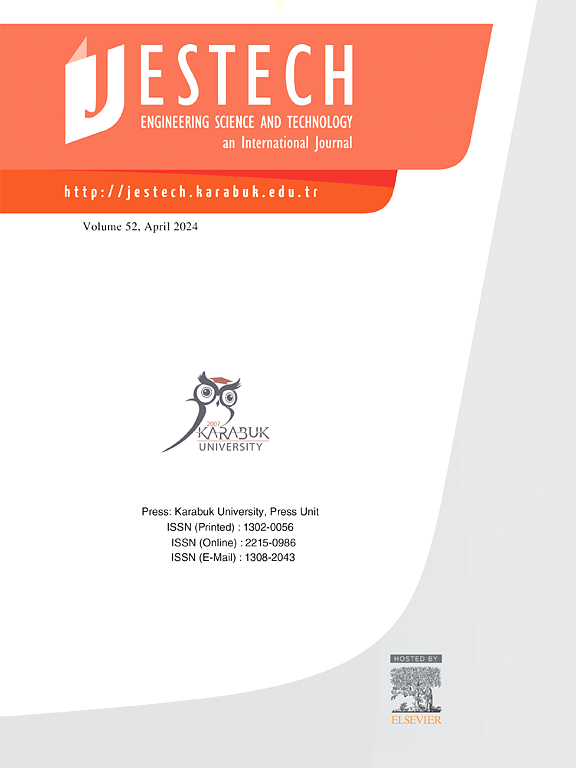Enhancing energy management in battery electric vehicles: A novel approach based on fuzzy Q-learning controller
IF 5.4
2区 工程技术
Q1 ENGINEERING, MULTIDISCIPLINARY
Engineering Science and Technology-An International Journal-Jestech
Pub Date : 2025-05-07
DOI:10.1016/j.jestch.2025.102070
引用次数: 0
Abstract
The global emphasis on sustainable transportation is driving the increasing adoption of Battery Electric Vehicles (BEVs), which offer independence from fossil fuels and zero emissions during operation. However, optimizing energy efficiency and vehicle performance in BEVs remains a significant challenge due to the dynamic nature of driving conditions. Current power control methods often struggle to adapt to these varying conditions, leading to suboptimal energy distribution and reduced performance. This paper presents a novel approach to power control in BEVs using a Fuzzy Q-learning Controller (FQLC), which dynamically adjusts the motor power coefficient based on real-time driving conditions. The FQLC optimizes energy distribution to the electric motor by adapting to factors such as vehicle speed, road slope, and battery state of charge (SOC). A comparative analysis between the Fuzzy Logic Controller (FLC) and the proposed FQLC demonstrates the advantages of the new system. The Modified Mean Absolute Error (MMAE) is used to quantitatively evaluate performance across various driving scenarios. The results show that the FQLC significantly outperforms the FLC, achieving MMAE values as low as 0.01, indicating substantial reductions in error rates. In the performed tests, the FQLC’s ability to manage energy use contributed to range extensions in certain cases, achieving an increase of up to 11 km. These findings highlight the FQLC potential as an innovative solution for BEV power control.
加强纯电动汽车能量管理:一种基于模糊q -学习控制器的新方法
全球对可持续交通的重视推动了越来越多的电动汽车(bev)的采用,这种汽车不依赖化石燃料,在运行过程中零排放。然而,由于驾驶条件的动态性,优化纯电动汽车的能源效率和车辆性能仍然是一项重大挑战。当前的功率控制方法往往难以适应这些变化的条件,导致能量分配不理想,性能下降。本文提出了一种基于模糊q -学习控制器(FQLC)的纯电动汽车功率控制新方法,该控制器根据实时驾驶情况动态调整电机功率系数。FQLC通过适应车辆速度、道路坡度和电池充电状态(SOC)等因素来优化电动机的能量分配。通过对模糊控制器(FLC)和所提出的模糊控制器(FQLC)的比较分析,证明了新系统的优越性。修正平均绝对误差(MMAE)用于定量评估不同驾驶场景下的性能。结果表明,FQLC显著优于FLC, MMAE值低至0.01,表明错误率大幅降低。在进行的测试中,FQLC管理能源使用的能力有助于在某些情况下延长续航里程,最多可增加11公里。这些发现凸显了FQLC作为纯电动汽车动力控制创新解决方案的潜力。
本文章由计算机程序翻译,如有差异,请以英文原文为准。
求助全文
约1分钟内获得全文
求助全文
来源期刊

Engineering Science and Technology-An International Journal-Jestech
Materials Science-Electronic, Optical and Magnetic Materials
CiteScore
11.20
自引率
3.50%
发文量
153
审稿时长
22 days
期刊介绍:
Engineering Science and Technology, an International Journal (JESTECH) (formerly Technology), a peer-reviewed quarterly engineering journal, publishes both theoretical and experimental high quality papers of permanent interest, not previously published in journals, in the field of engineering and applied science which aims to promote the theory and practice of technology and engineering. In addition to peer-reviewed original research papers, the Editorial Board welcomes original research reports, state-of-the-art reviews and communications in the broadly defined field of engineering science and technology.
The scope of JESTECH includes a wide spectrum of subjects including:
-Electrical/Electronics and Computer Engineering (Biomedical Engineering and Instrumentation; Coding, Cryptography, and Information Protection; Communications, Networks, Mobile Computing and Distributed Systems; Compilers and Operating Systems; Computer Architecture, Parallel Processing, and Dependability; Computer Vision and Robotics; Control Theory; Electromagnetic Waves, Microwave Techniques and Antennas; Embedded Systems; Integrated Circuits, VLSI Design, Testing, and CAD; Microelectromechanical Systems; Microelectronics, and Electronic Devices and Circuits; Power, Energy and Energy Conversion Systems; Signal, Image, and Speech Processing)
-Mechanical and Civil Engineering (Automotive Technologies; Biomechanics; Construction Materials; Design and Manufacturing; Dynamics and Control; Energy Generation, Utilization, Conversion, and Storage; Fluid Mechanics and Hydraulics; Heat and Mass Transfer; Micro-Nano Sciences; Renewable and Sustainable Energy Technologies; Robotics and Mechatronics; Solid Mechanics and Structure; Thermal Sciences)
-Metallurgical and Materials Engineering (Advanced Materials Science; Biomaterials; Ceramic and Inorgnanic Materials; Electronic-Magnetic Materials; Energy and Environment; Materials Characterizastion; Metallurgy; Polymers and Nanocomposites)
 求助内容:
求助内容: 应助结果提醒方式:
应助结果提醒方式:


